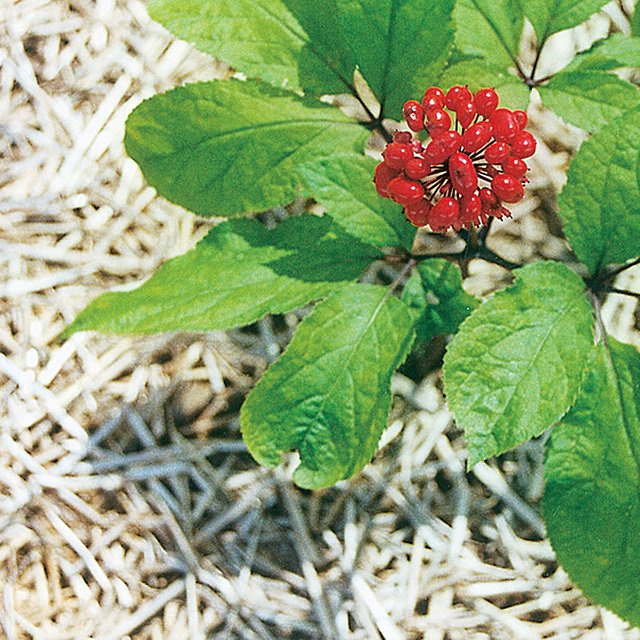If you have been following my blog for a while you probably know that, among other things, I also have an interest in plants. I see them as the nature’s laboratory, where an overarching evolutionary engineer gets creative and generates thousands of molecules with biological effects on our body. Unfortunately, today we are bombarded with claims, many are false, but some are true. Nonetheless, it can be challenging to discern between myth and truth.
I’ve heard a lot of hype around Ginseng. There are several claims about its beneficial effects, are they all bullshit? Or some of them are actually true? I decided to have a look and see what the scientific literature had to say about it.

Image CCO Creative Commons [Source]
Just for clarity, there are several species of this plant so from now on when I say Ginseng I refer to Panax quinquefolius (or American ginseng). The active ingredients of Ginseng are called ginsenosides and to make things difficult from the start there are about 20 different types of these, all of which are able to evoke pharmacological responses (Attele, Wu, and Yuan 1999).
What are the major claims about Ginseng?
Well, the main claims about ginsenosides are related to the central nervous system, cardiovascular, immune system, anti-stress, anti-cancer and anti-aging. These are a lot of claims…
Let’s start with some conflicting actions. Ginsenosides were found to be strong antioxidants which would explain the anti-aging and the beneficial effects on the immune system, yet they also stimulate the production of nitric oxide in the body, which is a free radical. However, not all free radicals are bad (it also depends on their concentration), for example nitric oxide mediates the communication between nerves, muscles and blood vessels. Generally, the presence of nitric oxide signals the blood vessels to dilate, this would explain why the assumption of Ginseng can increase the blood flow to the brain. This may help increasing mental performances and be beneficial for our cardiovascular system overall. Nitric oxide is also released by the nerves that control erectile function, so here we go with another effect of Ginseng, aphrodisiac.
Moreover, the ginsenosides were found to regulate also the GABAergic responses in the brain, countering the effects of stress and anxiety (Kimura et al. 1994; Yuan et al. 1998).

Image CCO Creative Commons [Source]
Regarding the anti-cancer effects, some ginsenosides were found to arrest the cell cycle in melanoma cells (Ota et al. 1997), obviously this does not mean that they have the same effect on all types of cancer but it’s certainly interesting that at least in some cases Ginseng seems to help. An additional argument in support of the anti-cancer activity of Ginseng is the fact that some ginsenosides were shown to increase NK and T cell activity (Kenarova et al. 1990).
Well, so far Ginseng seems to have more effects than I’ve expected and it’s not all. Ginsenosides are amphiphilic molecules, which means they can intercalate into the plasma membrane. In fact, they were found to displace the cholesterol from the cell membranes, increasing their fluidity (Pritchard et al. 1991). By modifying the cell membrane dynamics, ginsenosides most likely can also modulate the activity of ion channels and membrane-bound proteins like receptors, eliciting different cell responses. I realize this is a very general statement, but for example some ginsenosides were found to inhibit the influx of calcium ions through some channels or to regulate the influx of sodium ions in nerve cells (Kim, Kim, and Kim 1998). This may decrease the release of catecholamines in the central nerve system, thus having an anti-stress effect (Attele, Wu, and Yuan 1999). After reading all this, it’s not surprising that the Ginseng roots have been used for over 2000 years. They don’t seem to have many adverse effects, in fact someone estimated that to have a lethal dose of Ginseng one would have to take more than two pounds! Considering the how expensive these roots can get, I would say there are definitely cheaper ways to hurt yourselves.
References
Attele, Anoja S., Ji An Wu, and Chun Su Yuan. 1999. “Ginseng Pharmacology: Multiple Constituents and Multiple Actions.” Biochemical Pharmacology 58(11): 1685–93.
Kenarova, B, H Neychev, C Hadjiivanova, and V D Petkov. 1990. “Immunomodulating Activity of Ginsenoside Rg1 from Panax Ginseng.” Japanese journal of pharmacology 54(4): 447–54. http://www.ncbi.nlm.nih.gov/pubmed/2087006.
Kim, Young Sook, Dong Seon Kim, and Shin Il Kim. 1998. “Ginsenoside Rh2 and Rh3 Induce Differentiation of HL-60 Cells into Granulocytes: Modulation of Protein Kinase C Isoforms during Differentiation by Ginsenoside Rh2.” The International Journal of Biochemistry & Cell Biology 30(3): 327–38. http://linkinghub.elsevier.com/retrieve/pii/S1357272597001416.
Kimura, T et al. 1994. “Interactions of Ginsenosides with Ligand-Bindings of GABA(A) and GABA(B) Receptors.” General pharmacology 25(1): 193–99. http://www.ncbi.nlm.nih.gov/pubmed/8026706.
Ota, T et al. 1997. “G1 Phase-Specific Suppression of the Cdk2 Activity by Ginsenoside Rh2 in Cultured Murine Cells.” Life sciences 60(2): PL39-44. http://www.ncbi.nlm.nih.gov/pubmed/9000124.
Pritchard, K A, S M Schwarz, M S Medow, and M B Stemerman. 1991. “Effect of Low-Density Lipoprotein on Endothelial Cell Membrane Fluidity and Mononuclear Cell Attachment.” The American journal of physiology 260(1 Pt 1): C43-9. http://www.ncbi.nlm.nih.gov/pubmed/1987780.
Yuan, C S, A S Attele, J A Wu, and D Liu. 1998. “Modulation of American Ginseng on Brainstem GABAergic Effects in Rats.” Journal of ethnopharmacology 62(3): 215–22. http://www.ncbi.nlm.nih.gov/pubmed/9849631.
Communities that support me are:

Image created by @gtg

IMMAGINE CC0 CREATIVE COMMONS, si ringrazia @mrazura per il logo ITASTEM. Click here and vote for @davinci.witness
*This post has been reposted on: https://www.narrative.org/post/interesting-facts-about-ginseng




nice flower
Hello @aboutcoolscience
This is certainly a great revelation about pharmacological effects of Ginseng. In as much as I am quite aware of their health benefits, but not in this scale. This is very exhaustive. Thanks for sharing this piece of scientific information about Ginseng.
Regards
@eurogee
Ginseng is quite popular for a lot of health benefits including strength in cases of lethargy. I have not really researched on a lot of the claims but your write up has cleared some things. Nowadays, ginseng is available in form of tablets in several chemists and pharmacy around here. A lot of multivitamin drugs also incorporates ginseng into them.
good work man. Well done
Thanks, the problem with tablets and supplements is that often the active ingredients of plants are associated with sugars that modulate their pharmacological activity, in tablets and supplements these molecules may be refined and have different effects. Also not all of them mention which Ginseng plant they are talking about (each of them have different active ingredients even if they are from the same family of plants).
Hi
You opened my eyes to the many wonders of Ginseng and right now I can't wait to get myself some Ginseng supplements. Thanks for the exposition.
@sciencetech
STEM contributor
Great research you have done dear ,Thanx for your valuable views about this plant keep it up dear God bless you
My recent post
https://steemit.com/macrophotography/@hira-bashir/wild-flowers-my-favourite
Posted using Partiko Android
Its just not imaginary and too creative .. its looks different by his looks, as per ur photography it's a wonderful picture. Its too clear like an abstract picture.. full hd and higer pixel..
Hi @aboutcoolscience!
Your post was upvoted by utopian.io in cooperation with steemstem - supporting knowledge, innovation and technological advancement on the Steem Blockchain.
Contribute to Open Source with utopian.io
Learn how to contribute on our website and join the new open source economy.
Want to chat? Join the Utopian Community on Discord https://discord.gg/h52nFrV
Ginseng is a herbal medicine proven and tested by scientists
Posted using Partiko Android
This post has been voted on by the steemstem curation team and voting trail.
There is more to SteemSTEM than just writing posts, check here for some more tips on being a community member. You can also join our discord here to get to know the rest of the community!
The root and the leaves of this plant have benefits to humans, from antioxidant to energy-supporting properties. In skin care and is used to treat sexual dysfunction...I have a Health related blog, I love to post these type of post.